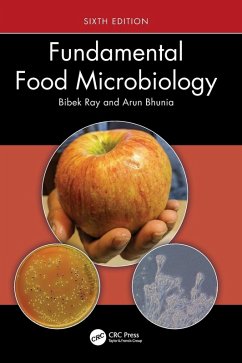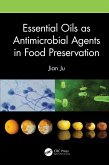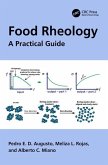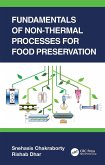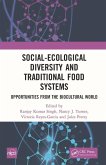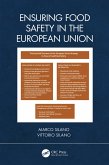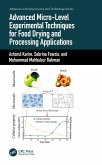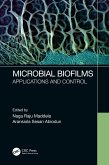Bibek Ray, Arun Bhunia (Purdue University, West Lafayette, Indiana, USA)
Fundamental Food Microbiology
Bibek Ray, Arun Bhunia (Purdue University, West Lafayette, Indiana, USA)
Fundamental Food Microbiology
- Gebundenes Buch
- Merkliste
- Auf die Merkliste
- Bewerten Bewerten
- Teilen
- Produkt teilen
- Produkterinnerung
- Produkterinnerung
Continuing its mission to cover all three areas of food microbiology: beneficial, spoilage, and pathogenic microbiology, the new edition features illustrations in color and provides an in-depth understanding of how to reduce microbial food spoilage, improve intervention technologies, and develop effective control methods for different foods.
Andere Kunden interessierten sich auch für
![Essential Oils as Antimicrobial Agents in Food Preservation Essential Oils as Antimicrobial Agents in Food Preservation]() Jian JuEssential Oils as Antimicrobial Agents in Food Preservation214,99 €
Jian JuEssential Oils as Antimicrobial Agents in Food Preservation214,99 €![Food Rheology Food Rheology]() Pedro E. D. AugustoFood Rheology113,99 €
Pedro E. D. AugustoFood Rheology113,99 €![Fundamentals of Non-Thermal Processes for Food Preservation Fundamentals of Non-Thermal Processes for Food Preservation]() Snehasis ChakrabortyFundamentals of Non-Thermal Processes for Food Preservation82,99 €
Snehasis ChakrabortyFundamentals of Non-Thermal Processes for Food Preservation82,99 €![Social-Ecological Diversity and Traditional Food Systems Social-Ecological Diversity and Traditional Food Systems]() Social-Ecological Diversity and Traditional Food Systems139,99 €
Social-Ecological Diversity and Traditional Food Systems139,99 €![Ensuring Food Safety in the European Union Ensuring Food Safety in the European Union]() Marco SilanoEnsuring Food Safety in the European Union156,99 €
Marco SilanoEnsuring Food Safety in the European Union156,99 €![Advanced Micro-Level Experimental Techniques for Food Drying and Processing Applications Advanced Micro-Level Experimental Techniques for Food Drying and Processing Applications]() Azharul Karim (Queensland University of Technology, Brisban, AustraAdvanced Micro-Level Experimental Techniques for Food Drying and Processing Applications122,99 €
Azharul Karim (Queensland University of Technology, Brisban, AustraAdvanced Micro-Level Experimental Techniques for Food Drying and Processing Applications122,99 €![Microbial Biofilms Microbial Biofilms]() Microbial Biofilms143,99 €
Microbial Biofilms143,99 €-
-
-
Continuing its mission to cover all three areas of food microbiology: beneficial, spoilage, and pathogenic microbiology, the new edition features illustrations in color and provides an in-depth understanding of how to reduce microbial food spoilage, improve intervention technologies, and develop effective control methods for different foods.
Hinweis: Dieser Artikel kann nur an eine deutsche Lieferadresse ausgeliefert werden.
Hinweis: Dieser Artikel kann nur an eine deutsche Lieferadresse ausgeliefert werden.
Produktdetails
- Produktdetails
- Verlag: Taylor & Francis Ltd
- 6 ed
- Seitenzahl: 507
- Erscheinungstermin: 21. Januar 2025
- Englisch
- Abmessung: 254mm x 178mm x 30mm
- Gewicht: 1392g
- ISBN-13: 9781032376882
- ISBN-10: 1032376880
- Artikelnr.: 71236454
- Herstellerkennzeichnung
- Libri GmbH
- Europaallee 1
- 36244 Bad Hersfeld
- gpsr@libri.de
- Verlag: Taylor & Francis Ltd
- 6 ed
- Seitenzahl: 507
- Erscheinungstermin: 21. Januar 2025
- Englisch
- Abmessung: 254mm x 178mm x 30mm
- Gewicht: 1392g
- ISBN-13: 9781032376882
- ISBN-10: 1032376880
- Artikelnr.: 71236454
- Herstellerkennzeichnung
- Libri GmbH
- Europaallee 1
- 36244 Bad Hersfeld
- gpsr@libri.de
Bibek Ray, PhD, currently Professor Emeritus, was a professor of food microbiology in the Department of Animal Science at the University of Wyoming, Laramie. Professor Ray earned BS and MS degrees in veterinary science from the University of Calcutta and the University of Madras, in India, respectively. He received his PhD in food science from the University of Minnesota in 1970 and joined the faculty in the Department of Food Science, North Carolina State University, and then the Department of Biology at Shaw University, both at Raleigh. He joined the University of Wyoming in 1981. There he expanded his research to intestinal beneficial bacteria, bacteriocins of Gram-positive bacteria, and high hydrostatic pressure preservation of food along with his previous research activities in the area of microbial sublethal injury. He also taught courses in food microbiology, food fermentation, food safety, and a course titled "Safety of Our Food" to nonscience undergraduates. His laboratory was involved in extensive studies in both basic and applied areas of the bacteriocin pediocin AcH from Pediococcus acidilactici H. In addition, his group studied various aspects of bacteriocins produced by Lactococcus, Leuconostoc, Lactobacillus, Pediococcus, and Bacillus and Staphylococcus spp. He received research funding from the National Science Foundation, American Public Health Association, National Live Stock and Meat Board, United States Department of Agriculture, United States Army Research, North Atlantic Treaty Organization (with Turkey) and Binational Agriculture Research Development Agency (with Israel), Wyoming Development Fund, and the industry. Before retirement, he was studying the combined effect of bacteriocins, ultrahigh hydrostatic pressure, and pulse field electricity and sublethal injury on the destruction of microbial cells and spores and its application in food preservation. In addition, Dr Ray established collaborative research programs with research institutes and universities in Turkey, Israel, India, Indonesia, and France. He also participated in symposiums, offered short courses, presented research activities and visited Research Laboratories in Japan, Indonesia, Thailand, Australia, New Zealand, India, Turkey, France, Spain, Germany, Norway, Belgium, England, Denmark, Netherlands, Hungary, Austria, Greece, Italy, Mexico, Canada and Argentina. Arun K. Bhunia, BVSc, PhD, is a professor of molecular food microbiology in the Department of Food Science and the Department of Veterinary Comparative Pathobiology (Courtesy) at Purdue University, West Lafayette, Indiana (USA). He is also affiliated with the Purdue Institute of Immunology, Inflammation and Infectious Disease and the Purdue University Interdisciplinary Life Sciences program (PULSc). Professor Bhunia received his bachelor of veterinary medicine degree (1984) from Bidhan Chandra Krishi Viswa Vidyalaya (currently West Bengal University of Fisheries and Animal Sciences), West Bengal, India. He received his PhD (1989) from University of Wyoming (USA) under the mentorship of Professor Bibek Ray and postdoctoral training (1995) from University of Arkansas, Fayetteville, under the mentorship of Prof. Michael G. Johnson and then joined Alabama A&M University (Huntsville, Alabama) as an assistant professor in 1995. In 1998, he joined the Department of Food Science at Purdue University. He teaches four graduate-level courses: Food Microbiology, Microbial Foodborne Pathogens (major topics: Mechanism of the pathogenesis of foodborne pathogens and toxins and the host-parasite interactions); Microbial Techniques for Food Pathogen (Laboratory course that incorporates rapid methods employing immunoassays, and genetic and biosensor tools), and co-teaches a graduate level journal club, Intestinal Microbiology and Immunology. In addition, he routinely lectures in courses such as Principles of Public Health (both undergraduate and graduate level) on foodborne diseases and Veterinary Microbiology and Mycology on zoonotic foodborne pathogens. Prof. Bhunia's laboratory maintains a balanced research program (basic and applied) to address problems related to foodborne pathogens in the following areas: microbial pathogenesis (host-pathogen interaction), immunology, probiotic bioengineering, and foodborne pathogen detection. His research has been funded by grants from the U.S. Department of Agriculture, the National Science Foundation, the National Cattleman's Beef Association, the National Institute of Health, and Feed Company.
Part I Introduction to Microbes in Foods: History and Development of Food
Microbiology 1. History and Development of Food Microbiology 2.
Characteristics of Predominant Microorganisms in Food 3. Sources of
Microorganisms in Food 4. Microbiological Quality of Foods and Its
Significance Part II Microbial Growth Response in the Food Environment:
Microbial Growth and Predictive Modeling 5. Microbial Growth and Predictive
Modeling 6. Factors Influencing Microbial Growth in Food 7. Microbial
Attachments and Biofilm Formation 8. Microbial Metabolism of Food
Components 9. Microbial Sporulation and Germination 10. Microbial Stress
Response in the Food Environment Part III Beneficial Uses of Microorganisms
in Food 11. Microorganisms Used in Food Fermentation 12. Genetics and
Biochemistry of Beneficial Traits 13. Starter Cultures and Bacteriophages
14. Microbiology of Fermented Food Production 15.Intestinal Bacteria and
Probiotics 16. Food Biopreservatives of Microbial Origin, Bacteriocin and
Nanotechnology 17. Food Ingredients and Enzymes of Microbial Origin Part IV
Microbial Food Spoilage 18. Important Factors in Microbial Food Spoilage
19. Spoilage of Specific Food Groups 20. Food Spoilage Bacteria in
Refrigerated Foods 21. Food Spoilage by Microbial Enzymes 22. Indicators of
Microbial Food Spoilage Part V Microbial Foodborne Diseases 23. Foodborne
Diseases and Food Safety Regulations 24. Foodborne Intoxications 25.
Foodborne Bacterial Infections 26. Foodborne Toxico-infection 27. Viruses,
Parasites, Molds and Mycotoxins, and Fish and Shellfish Toxins 28.
Indicators of Bacterial Pathogens Part VI Hazard Analysis Critical Control
Points and Control of Microorganisms in Foods 29. Hazard Analysis Critical
Control Points (HACCP) 30. Control by Cleaning, Sanitation and Disinfection
31. Control by Physical Removal 32. Control by Heat (Thermal Processing)
33. Control by Low Temperature (Refrigeration) 34. Control by Reduced Water
Activity (Drying) 35. Control by Low pH and Organic Acids 36. Control by
Modified Atmosphere (or Reducing O-R Potential) 37. Control by
Antimicrobial Preservatives and Bacteriophages 38. Control of Microbes by
Irradiation 39. Control of Microbes by Novel Processing Technologies and
Hurdle Methods 40. Conventional, Immunological, Molecular, and Biosensor
Based Detection Methods
Microbiology 1. History and Development of Food Microbiology 2.
Characteristics of Predominant Microorganisms in Food 3. Sources of
Microorganisms in Food 4. Microbiological Quality of Foods and Its
Significance Part II Microbial Growth Response in the Food Environment:
Microbial Growth and Predictive Modeling 5. Microbial Growth and Predictive
Modeling 6. Factors Influencing Microbial Growth in Food 7. Microbial
Attachments and Biofilm Formation 8. Microbial Metabolism of Food
Components 9. Microbial Sporulation and Germination 10. Microbial Stress
Response in the Food Environment Part III Beneficial Uses of Microorganisms
in Food 11. Microorganisms Used in Food Fermentation 12. Genetics and
Biochemistry of Beneficial Traits 13. Starter Cultures and Bacteriophages
14. Microbiology of Fermented Food Production 15.Intestinal Bacteria and
Probiotics 16. Food Biopreservatives of Microbial Origin, Bacteriocin and
Nanotechnology 17. Food Ingredients and Enzymes of Microbial Origin Part IV
Microbial Food Spoilage 18. Important Factors in Microbial Food Spoilage
19. Spoilage of Specific Food Groups 20. Food Spoilage Bacteria in
Refrigerated Foods 21. Food Spoilage by Microbial Enzymes 22. Indicators of
Microbial Food Spoilage Part V Microbial Foodborne Diseases 23. Foodborne
Diseases and Food Safety Regulations 24. Foodborne Intoxications 25.
Foodborne Bacterial Infections 26. Foodborne Toxico-infection 27. Viruses,
Parasites, Molds and Mycotoxins, and Fish and Shellfish Toxins 28.
Indicators of Bacterial Pathogens Part VI Hazard Analysis Critical Control
Points and Control of Microorganisms in Foods 29. Hazard Analysis Critical
Control Points (HACCP) 30. Control by Cleaning, Sanitation and Disinfection
31. Control by Physical Removal 32. Control by Heat (Thermal Processing)
33. Control by Low Temperature (Refrigeration) 34. Control by Reduced Water
Activity (Drying) 35. Control by Low pH and Organic Acids 36. Control by
Modified Atmosphere (or Reducing O-R Potential) 37. Control by
Antimicrobial Preservatives and Bacteriophages 38. Control of Microbes by
Irradiation 39. Control of Microbes by Novel Processing Technologies and
Hurdle Methods 40. Conventional, Immunological, Molecular, and Biosensor
Based Detection Methods
Part I Introduction to Microbes in Foods: History and Development of Food
Microbiology 1. History and Development of Food Microbiology 2.
Characteristics of Predominant Microorganisms in Food 3. Sources of
Microorganisms in Food 4. Microbiological Quality of Foods and Its
Significance Part II Microbial Growth Response in the Food Environment:
Microbial Growth and Predictive Modeling 5. Microbial Growth and Predictive
Modeling 6. Factors Influencing Microbial Growth in Food 7. Microbial
Attachments and Biofilm Formation 8. Microbial Metabolism of Food
Components 9. Microbial Sporulation and Germination 10. Microbial Stress
Response in the Food Environment Part III Beneficial Uses of Microorganisms
in Food 11. Microorganisms Used in Food Fermentation 12. Genetics and
Biochemistry of Beneficial Traits 13. Starter Cultures and Bacteriophages
14. Microbiology of Fermented Food Production 15.Intestinal Bacteria and
Probiotics 16. Food Biopreservatives of Microbial Origin, Bacteriocin and
Nanotechnology 17. Food Ingredients and Enzymes of Microbial Origin Part IV
Microbial Food Spoilage 18. Important Factors in Microbial Food Spoilage
19. Spoilage of Specific Food Groups 20. Food Spoilage Bacteria in
Refrigerated Foods 21. Food Spoilage by Microbial Enzymes 22. Indicators of
Microbial Food Spoilage Part V Microbial Foodborne Diseases 23. Foodborne
Diseases and Food Safety Regulations 24. Foodborne Intoxications 25.
Foodborne Bacterial Infections 26. Foodborne Toxico-infection 27. Viruses,
Parasites, Molds and Mycotoxins, and Fish and Shellfish Toxins 28.
Indicators of Bacterial Pathogens Part VI Hazard Analysis Critical Control
Points and Control of Microorganisms in Foods 29. Hazard Analysis Critical
Control Points (HACCP) 30. Control by Cleaning, Sanitation and Disinfection
31. Control by Physical Removal 32. Control by Heat (Thermal Processing)
33. Control by Low Temperature (Refrigeration) 34. Control by Reduced Water
Activity (Drying) 35. Control by Low pH and Organic Acids 36. Control by
Modified Atmosphere (or Reducing O-R Potential) 37. Control by
Antimicrobial Preservatives and Bacteriophages 38. Control of Microbes by
Irradiation 39. Control of Microbes by Novel Processing Technologies and
Hurdle Methods 40. Conventional, Immunological, Molecular, and Biosensor
Based Detection Methods
Microbiology 1. History and Development of Food Microbiology 2.
Characteristics of Predominant Microorganisms in Food 3. Sources of
Microorganisms in Food 4. Microbiological Quality of Foods and Its
Significance Part II Microbial Growth Response in the Food Environment:
Microbial Growth and Predictive Modeling 5. Microbial Growth and Predictive
Modeling 6. Factors Influencing Microbial Growth in Food 7. Microbial
Attachments and Biofilm Formation 8. Microbial Metabolism of Food
Components 9. Microbial Sporulation and Germination 10. Microbial Stress
Response in the Food Environment Part III Beneficial Uses of Microorganisms
in Food 11. Microorganisms Used in Food Fermentation 12. Genetics and
Biochemistry of Beneficial Traits 13. Starter Cultures and Bacteriophages
14. Microbiology of Fermented Food Production 15.Intestinal Bacteria and
Probiotics 16. Food Biopreservatives of Microbial Origin, Bacteriocin and
Nanotechnology 17. Food Ingredients and Enzymes of Microbial Origin Part IV
Microbial Food Spoilage 18. Important Factors in Microbial Food Spoilage
19. Spoilage of Specific Food Groups 20. Food Spoilage Bacteria in
Refrigerated Foods 21. Food Spoilage by Microbial Enzymes 22. Indicators of
Microbial Food Spoilage Part V Microbial Foodborne Diseases 23. Foodborne
Diseases and Food Safety Regulations 24. Foodborne Intoxications 25.
Foodborne Bacterial Infections 26. Foodborne Toxico-infection 27. Viruses,
Parasites, Molds and Mycotoxins, and Fish and Shellfish Toxins 28.
Indicators of Bacterial Pathogens Part VI Hazard Analysis Critical Control
Points and Control of Microorganisms in Foods 29. Hazard Analysis Critical
Control Points (HACCP) 30. Control by Cleaning, Sanitation and Disinfection
31. Control by Physical Removal 32. Control by Heat (Thermal Processing)
33. Control by Low Temperature (Refrigeration) 34. Control by Reduced Water
Activity (Drying) 35. Control by Low pH and Organic Acids 36. Control by
Modified Atmosphere (or Reducing O-R Potential) 37. Control by
Antimicrobial Preservatives and Bacteriophages 38. Control of Microbes by
Irradiation 39. Control of Microbes by Novel Processing Technologies and
Hurdle Methods 40. Conventional, Immunological, Molecular, and Biosensor
Based Detection Methods

